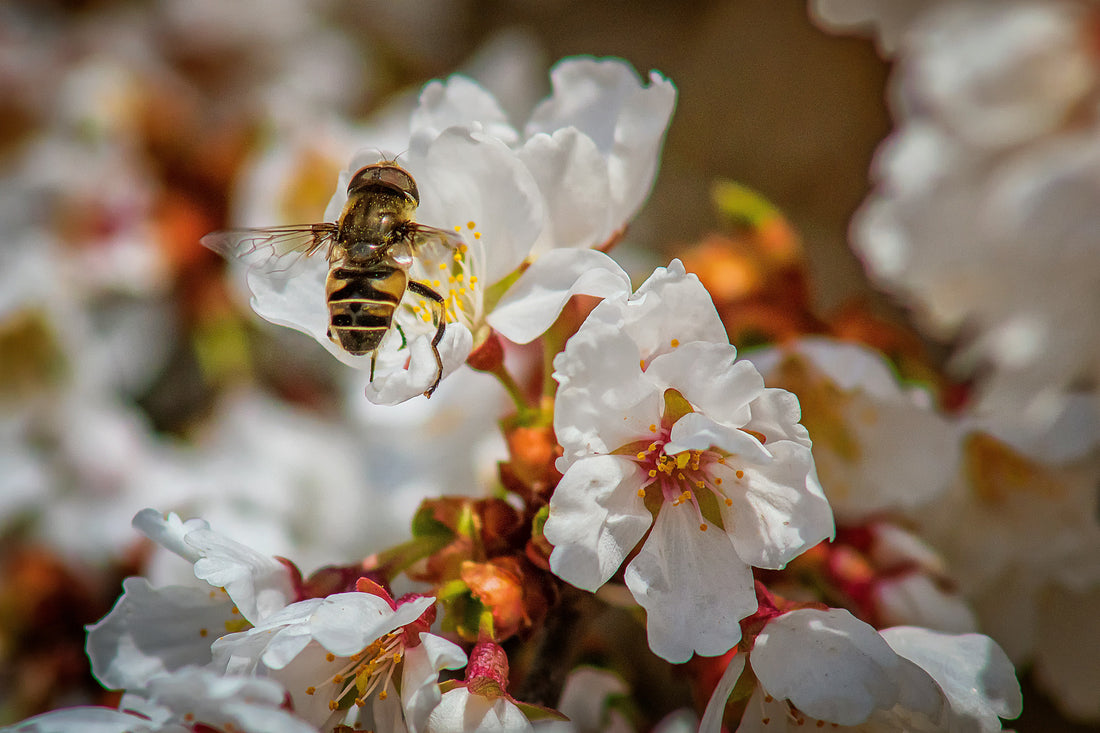Mānuka Honey: An Overview
Mānuka honey is a unique monofloral honey made from the nectar of the mānuka tree (Leptospermum scoparium), native to New Zealand and parts of coastal Australia. Known for its thick texture, earthy flavour, and high methylglyoxal (MGO) content, it is valued for its antibacterial properties and medicinal benefits.
Identification and Production
This honey is created by European honey bees (Apis mellifera) that collect nectar from the mānuka tree, a plant believed to have originated in Australia before spreading to New Zealand. The tree grows wild in both southeastern Australia and New Zealand. Mānuka honey is characterized by its thick texture, which is due to the presence of proteins or colloids, as well as its distinct dark cream to deep brown color.
The mānuka tree often blooms alongside Kunzea ericoides (commonly known as kānuka), another species in the Myrtaceae family. Since their flowers have a similar appearance, some beekeepers may find it difficult to distinguish between the two, and their pollen can be challenging to differentiate.
Quality Standards and Certification
To ensure authenticity, New Zealand requires mānuka honey to pass a five-factor scientific test before export. The UMF Honey Association further certifies quality based on four key markers. In Australia, the Australian Manuka Honey Association (AMHA) sets similar standards, requiring lab testing to verify purity and key compounds like MGO, DHA, and leptosperin.
In this article, we’ll explore five key benefits of mānuka honey, from its ability to support wound healing to its role in boosting digestive and immune health.
Benefits of Manuka Honey
1. Supports Wound Healing
For centuries, honey has been used to treat wounds, burns, sores, and boils due to its natural antibacterial and antioxidant properties. It helps create a moist healing environment while forming a protective barrier that prevents infections.
Research suggests that Mānuka honey can accelerate wound healing, promote tissue regeneration, and even reduce pain in burn patients. Additionally, it has shown promise in treating diabetic ulcers and combating infections caused by antibiotic-resistant bacteria like MRSA (methicillin-resistant Staphylococcus aureus).
2. May promote Oral Health
Studies have shown that Mānuka honey can help combat harmful oral bacteria linked to plaque, gum inflammation, and tooth decay. Its high antibacterial activity makes it effective in inhibiting the growth of bacteria like Porphyromonas gingivalis and Aggregatibacter actinomycetemcomitans, which are associated with periodontal issues.
Although it might seem surprising that honey could benefit dental health, Mānuka honey’s antibacterial properties actually prevent dental cavities. Research suggests it can reduce plaque buildup, lowering the risk of gingivitis and other gum diseases by targeting harmful bacteria in the mouth.
3. Promote Digestive Health
Mānuka honey may support a healthy gut by targeting harmful bacteria. Studies suggest it can help treat gastric ulcers caused by Helicobacter pylori (H. pylori) and may also aid in managing Clostridium difficile (C. diff), a bacteria responsible for diarrhea and intestinal inflammation. With its powerful antibacterial and soothing properties, Mānuka honey may be a natural way to promote digestive balance and gut health.
4. Soothes Sore Throats and Cough
Mānuka honey’s powerful antibacterial and anti-inflammatory properties make it an excellent remedy for soothing throat irritation and alleviating discomfort caused by coughs. Research shows that Mānuka honey can effectively reduce the severity of coughs, particularly those caused by upper respiratory infections (URIs) such as the common cold, bronchitis, and influenza.
Honey, particularly Mānuka, has long been used alongside lemon as a natural solution for colds and coughs, and studies support its effectiveness. In 2010, research found that honey was more effective than over-the-counter cough suppressants in children.
Mānuka honey works by calming throat irritation and reducing cough frequency, making it a safer and more natural alternative to medications, which are often less effective and can carry harmful side effects.
5. May Help with inflammatory Skin Condition
Known for its antibacterial and wound-healing properties, Mānuka honey is being explored as a potential treatment for inflammatory skin conditions like rosacea and acne. Early laboratory studies suggest that it may help regulate the skin’s immune response, which could contribute to reducing inflammation and irritation. However, while these findings are promising, more research is needed to fully understand its effectiveness for a broader range of skin conditions.
Difference Between Manuka Honey and Regular Honey
• Medicinal Properties: Manuka honey has stronger antibacterial and anti-inflammatory effects than regular honey, making it effective for wound healing, burns, coughs, and colds.
• Taste: Manuka honey has a bitter flavor and strong aroma due to its high methylglyoxal (MGO) content, while regular honey is sweeter and may contain additives.
• Source: Manuka honey comes from bees that collect nectar exclusively from the mānuka tree, whereas regular honey is made from various flowers.
Why Is Mānuka Honey So Expensive?
Mānuka honey is costly due to its rarity, as it is only produced in specific regions of New Zealand and Australia. Its production is also labor-intensive—bees may need to be relocated, and the mānuka tree has a short flowering period of just 4–6 weeks per year. Additionally, shipping costs add to the price. Despite the high cost, many believe its benefits make it worth the investment.
Who Should Avoid Mānuka Honey?
Mānuka honey is generally safe for most adults but should be avoided by those with honey or bee allergies. People with diabetes should also monitor their blood sugar levels, as it is high in natural sugars.
The NHS advises against giving honey to infants under one year old due to the risk of bacterial contamination that can cause serious illness.
While Mānuka honey has many health benefits, some claims are based on limited research. If you have any concerns, consult your doctor before using it.
Conclusion
Mānuka honey is a distinctive and potent honey with impressive antibacterial, anti-inflammatory, and healing benefits. Its therapeutic effects span across various areas, including wound healing, digestive support, oral care, and skin health, making it far more beneficial than regular honey. Although it is pricey due to its limited production and high-quality standards, many find the investment worthwhile for its wide-ranging health benefits.
For those looking to experience the benefits of Mānuka honey, it’s essential to choose a genuine product with a verified UMF or MGO rating to ensure its purity and effectiveness. Whether used as a remedy or a daily health boost, Mānuka honey can be a valuable addition to your wellness routine.

